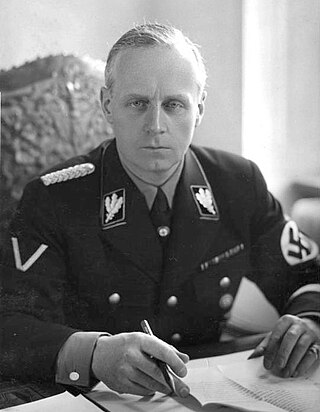| |||||
| Decades: | |||||
|---|---|---|---|---|---|
| See also: | |||||
The following lists events that happened during 1940 in the Union of Soviet Socialist Republics . [1]
| |||||
| Decades: | |||||
|---|---|---|---|---|---|
| See also: | |||||
The following lists events that happened during 1940 in the Union of Soviet Socialist Republics . [1]

Ulrich Friedrich-Wilhelm Joachim von Ribbentrop was a German politician and diplomat who served as Minister of Foreign Affairs of Nazi Germany from 1938 to 1945.

Kliment Yefremovich Voroshilov, popularly known as Klim Voroshilov, was a prominent Soviet military officer and politician during the Stalin-era. He was one of the original five Marshals of the Soviet Union, the second highest military rank of the Soviet Union, and served as Chairman of the Presidium of the Supreme Soviet, the nominal Soviet head of state, from 1953 to 1960.

The Workers' and Peasants' Red Army, often shortened to the Red Army, was the army and air force of the Russian Soviet Republic and, from 1922, the Soviet Union. The army was established in January 1918 by Leon Trotsky to oppose the military forces of the new nation's adversaries during the Russian Civil War, especially the various groups collectively known as the White Army. In February 1946, the Red Army was renamed the "Soviet Army" - which in turn became the Russian Army on 7 May 1992, following the dissolution of the Soviet Union.
1940 (MCMXL) was a leap year starting on Monday of the Gregorian calendar, the 1940th year of the Common Era (CE) and Anno Domini (AD) designations, the 940th year of the 2nd millennium, the 40th year of the 20th century, and the 1st year of the 1940s decade.

The Communist International (Comintern), also known as the Third International, was an international organization founded in 1919 that advocated world communism, and which was led and controlled by the Communist Party of the Soviet Union. The Comintern resolved at its Second Congress in 1920 to "struggle by all available means, including armed force, for the overthrow of the international bourgeoisie and the creation of an international soviet republic as a transition stage to the complete abolition of the state". The Comintern was preceded by the dissolution of the Second International in 1916.

Mikhail Ivanovich Kalinin was a Soviet politician and Russian Old Bolshevik revolutionary. He served as head of state of the Russian Soviet Federative Socialist Republic and later of the Soviet Union from 1919 to 1946. From 1926, he was a member of the Politburo of the Communist Party of the Soviet Union.

Semyon Mikhailovich Budyonny was a Soviet cavalryman, military commander during the Russian Civil War, Polish-Soviet War and World War II, and politician, who was a close political ally of Soviet leader Joseph Stalin.
The Leningrad affair, or Leningrad case, was a series of criminal cases fabricated in the late 1940s–early 1950s by Joseph Stalin in order to accuse a number of prominent Leningrad based authority figures and members of the All-Union Communist Party (Bolsheviks) of treason and intention to create an anti-Soviet, Russian nationalist, organization based in the city. This happened in the aftermath of the Siege of Leningrad during the war, the victorious end of which led to the mayor, his deputies and others who kept Nazi German forces out of the city earning fame and strong support as heroes all over the USSR. This in turn would lead to them becoming the target of Joseph Stalin's long established suppression of emerging popular figures deemed to be potential rivals or problems in the future.

The Allies, formally referred to as the United Nations from 1942, were an international military coalition formed during World War II (1939–1945) to oppose the Axis powers. Its principal members by the end of 1941 were the "Big Four" – United Kingdom, United States, Soviet Union, and China.
Events from the year 1940 in the United Kingdom. The year was dominated by Britain's involvement in the Second World War, which commenced in September the previous year, as well as the numerous enemy air raids on Britain and thousands of subsequent casualties. Although the war continued, Britain did triumph in the Battle of Britain and Nazi Germany's invasion attempt did not take place.

The Chairman of the Council of People's Commissars of the Soviet Union was the head of government of the Soviet Union during the existence of the Council of People's Commissars of the Soviet Union from 1923 to 1946.
Events from the year 1940 in France.
Events in the year 1940 in Germany.
These are lists of political office-holders in Estonia.

The history of Soviet Russia and the Soviet Union (USSR) reflects a period of change for both Russia and the world. Though the terms "Soviet Russia" and "Soviet Union" often are synonymous in everyday speech, when referring to the foundations of the Soviet Union, "Soviet Russia" often specifically refers to brief period between the October Revolution of 1917 and the creation of the Soviet Union in 1922.
Events in the year 1940 in Japan. It corresponds to Shōwa 15 (昭和15年) in the Japanese calendar.
The following lists events that happened during 1937 in the Union of Soviet Socialist Republics.
The following lists events that happened during 1938 in the Union of Soviet Socialist Republics.
The following lists events that happened during 1943 in the Union of Soviet Socialist Republics.
The following lists events that happened during 1950 in the Union of Soviet Socialist Republics.